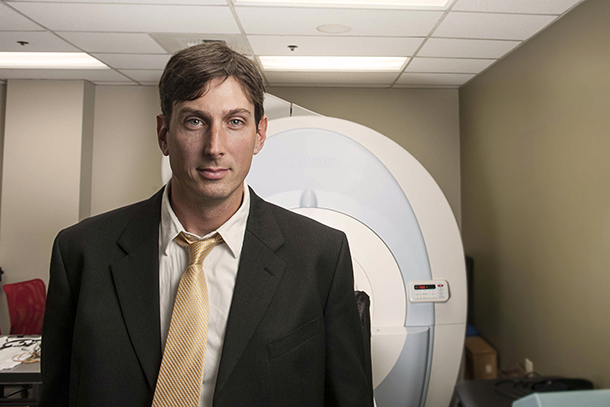Jason Kutch, PhD, assistant professor in the USC Division of Biokinesiology and Physical Therapy, has been awarded a $1.3 million grant from the National Institutes of Health (NIH) to further his research on chronic prostatitis/chronic pelvic pain syndrome (CP/CPPS) in men.
CP/CPPS is a poorly understood pain disorder that affects millions of men. It has no established cause, and there are no generally effective treatments. The pain can be debilitating, affecting one’s ability to perform a number of ordinary tasks, such as sitting and walking. The disorder also can affect bowel and bladder function.
“CP/CPPS symptoms can start suddenly for men in their 20s, 30s or 40s,” Kutch explained. “These symptoms can last for a long time and really upend someone’s life, so there is a pressing need for a better understanding of this condition.”
Kutch recently published the first neuroimaging study comparing men with CP/CPPS to healthy men. His preliminary research showed that men with the disorder experience dysfunction in a specific region of the brain called the motor cortex, which controls pelvic floor muscles.
These findings fit with the physical therapy approach to treating CP/CPPS. One of Kutch’s collaborators on the project, Daniel Kirages, DPT, instructor of clinical physical therapy, is a physical therapist who treats the disorder with a combination of pelvic floor muscle stretching and relaxation.
“We are excited about our preliminary findings, but we need to carefully establish the link between brain and pelvic floor muscle dysfunction before we can improve therapy for CP/CPPS,” Kutch said.
The recently awarded NIH grant will help Kutch build on his groundbreaking research for the next four years. Kutch plans to perform neuroimaging studies on nearly 50 men with chronic pelvic pain and 50 men who do not have a history of pelvic pain. He also will measure pelvic floor muscle activity to better understand the link between dysfunction in the brain and poor pelvic muscle control.
Kutch explained that there had only been a small amount of research into CP/CPPS until recently. The lack of research has left physicians and physical therapists who treat patients with CP/CPPS with few treatment options and very little information to give their patients about the disorder’s cause.
Kutch hopes his research will begin to bridge the gap in both areas. He would like to see the research lead to a new understanding of CP/CPPS that will make it easier to explain the source of disorder’s symptoms to patients.
He also expects that it will reveal promising new treatments for men who suffer from CP/CPPS.
For example, this research may provide the groundwork for additional investigation into whether non-invasive motor cortex stimulation, combined with physical therapy, can be a better treatment option.
“Our hope is that this study will really point us toward next generation therapies for CP/CPPS,” Kutch added.
— Hope Hamashige


